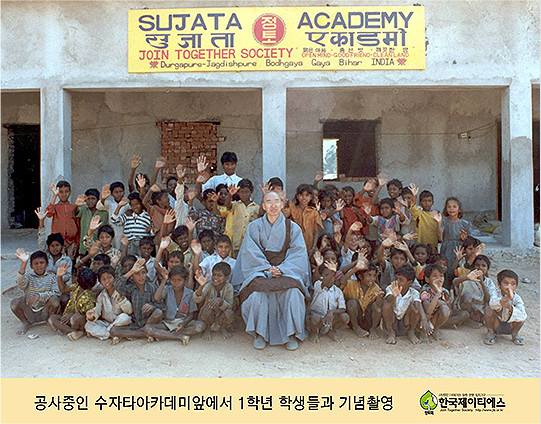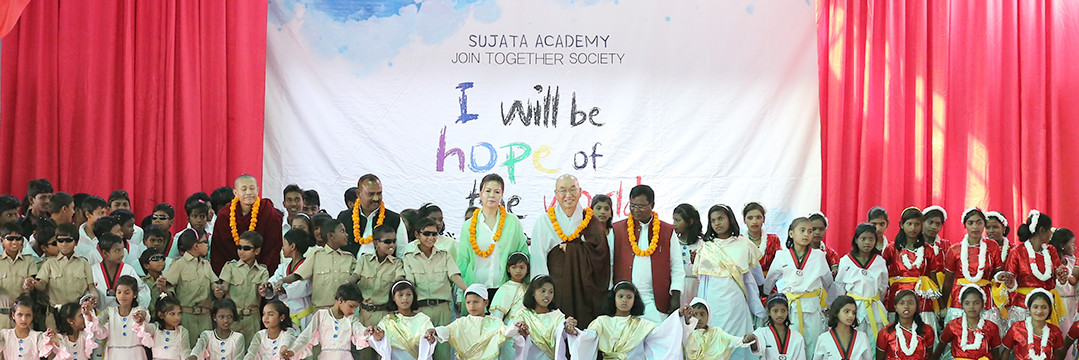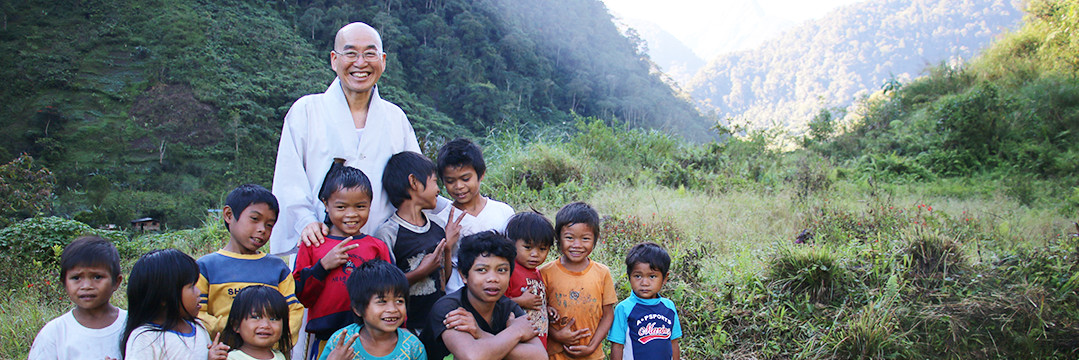The Establishment and Activities of JTS India
“The Hungry Must Eat”
Ven. Pomnyun Sunim went on a pilgrimage to India in 1991 after he was ordained a bhikkhu. He met a beggar woman with a baby in her arms who motioned him to follow her to a food store. She asked him to buy her some baby formula for her baby. However, he refused because his travel guide in India had advised him not to give away more than one rupee, and the price of dried milk was 60 rupees. When he got back to the hotel and calculated 60 rupees in Korean won and found that it was just 2,400 won, which is a little over $2. At that moment, Pomnyun Sunim felt ashamed because he realized that he had coldly refused to help a woman who had asked for formula for her hungry baby as if she had asked him for his entire fortune. He said, “I had been raising my voice for liberation of people from suffering, but when I encountered an opportunity to help a desperate person, I turned away. After deep repentance, I began to help the destitute children in India.
Ven. Pomnyun Sunim asked the children who were begging in the streets of India why they weren’t in school. He was extremely shocked when they answered that there was no school. In 1994, Pomnyun Sunim built the first school in a village of “Untouchables.” He did not build the school in the way that most relief organizations do. He gathered the people of the village and made them realize the necessity of a school. After he obtained a promise from the villagers that they will volunteer their labor and donate land to build a school, he financed the construction and operation of the school. He aimed to build a school that belonged to them rather than to JTS.

“The elementary students brought their younger siblings to school, which made the classroom too noisy for instruction, so we opened kindergarten classes. We also built an infirmary for the sick children. Soon, there were so many village people coming to the infirmary asking for medicine that we asked a doctor to work as a volunteer at the infirmary. However, when the number of patients who visited the infirmary daily increased to more than one hundred, we had no choice but to build a hospital. That’s how our operation in India grew.
After the doctor evaluated that the students fainted often from anemia due to malnutrition, we gave out a banana and an egg to each student for lunch. The school lunch attracted those students who had not been previously interested in coming to school, so the number of students doubled. The school had
been built for 150 students, but the number of students grew to three hundred. We had to turn away some students who came from neighboring villages.

When the students graduated from elementary school, some of them requested that we establish a middle school. After starting a middle school program, we build a kindergarten in every neighborhood and appointed the middle school students as Kindergarten teachers. We purchased bicycles for the middle school students so that they could teach at the kindergarten in the mornings and attend middle school in the afternoon. Currently, there are fourteen kindergartens, an elementary school, a branch elementary school, and a middle school we operate in Dungeshwari, India. We have over 900 kindergarteners, over 500 elementary school students, and over 120 middle school students.”

Ven. Pomnyun Sunim also built a school in the conflict region of Mindanao, the Philippines. When teachers could not be dispatched to schools of native people living in the mountain areas occupied by dangerous rebel forces, Ven. Pomnyun Sunim met the leader of the rebel forces to secure the safety of the volunteer workers at the school. Later, JTS built over 50 schools which includes 39 elementary schools, high schools, and special schools for the disabled. It also constructed a public health center, student dormitories, and teacher’s quarters. Ven. Pomnyun Sunim also built a traditional school and an auditorium to help the natives of Mindanao preserve and protect their traditional culture.

